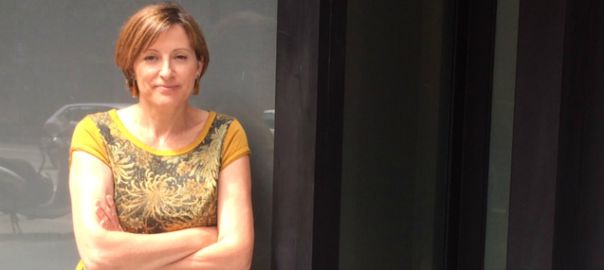19.06.2018 - 08:09
|
Actualització: 19.06.2018 - 10:09
Carme Forcadell, president of the Catalan parliament, testified in court today in Barcelona in the case brought against her by the Spanish judiciary for allowing a debate in the Catalan chamber on the independence roadmap to break away from Spain.
Gestures of solidarity with Forcadell have abounded, as few people in Catalonia are as respected as she is. A school teacher before becoming president of parliament, she previously led the most influential nonprofit in Catalonia promoting the independence cause, the Catalan National Assembly (ANC), an organization which conquered the heart of many citizens.
Carme Forcadell (1956) was born in the town of Xerta (population, 2,000), in the Baix Ebre region. The daughter of a housewife and a mechanic, she was known in Xerta as the daughter of the house of Ca la Toneta. Forcadell completed her primary education in the local school, attended high school in Tortosa, and university in Barcelona, where she earned undergraduate degrees in journalism and philosophy and a master’s in Catalan language at the Autonomous University of Barcelona. She is married to an engineer, is the mother of two grown children, and lives in downtown Sabadell.
She never used professionally her degree in philosophy, but instead became a journalist for the programme Giravolt on Spanish National Television, and for the newspaper’s, until she married and had children. She then passed the state exam to become a civil servant in the Catalan government’s Department of Education, where she helped develop teacher training and Catalan language programmes.
She is one of the founders of the Language Association, as well as a member of the Platform for Language and the nonprofit Òmnium Cultural. She has said that it was the Catalan language that pushed her to become a supporter of independence, after she arrived in Barcelona and realized that the language needed a state in order to ensure its future.
A surprising piece of information about the parliamentary president is the extent to which she is a world traveller. In the last few years alone, Forcadell has visited Myanmar; Guatemala; Syria; Japan; China; Belarus; Montenegro; Moldova; Ukraine; Tunisia; Egypt; Jordan; Senegal; Israel; and Morocco (four times); as well as London; Amsterdam; Vienna; Dubrovnik; St. Petersburg; Moscow; Angkor, in Cambodia; and Tashkent, Bukhara and Samarkand, in Uzbekistan. And these are just a few names from the long list of cities and countries she has been to. She travels with friends or even alone.
When in Sabadell, she takes any opportunity she has to attend the opera locally. She has read every book by Catalan authors Jesús Moncada and Jaume Cabré.
Forcadell is a member of the leftist pro-independence political party Esquerra Republicana de Catalunya. From 2003 to 2007, she was a councilwoman for the party in Sabadell, and then a minister in the Catalan government. Her career within the party ended there, but Forcadell has exercised her political talents through other channels.
Six years ago, as vice president of the organization Platform for the Right to Decide (PDD), she helped bring about the vote held in more than five hundred localities throughout Catalonia to gauge citizen support for independence. Though it hasn’t attracted much attention, PDD is key to understanding what followed. Those of us who remember that time recall her as someone who was rather meek before the press, nervous, even fragile. A far cry from the Carme Forcadell we all know as head of the ANC. In just a few months she made incredible strides, her colleagues within the organization recall.
As head of the ANC, she was able to overcome one of the great evils that plague the independence movement: internal strife; opposed factions creating a weakened, ailing brand of separatism; Pere Pugès, on the one hand, and Carles Castellanos on the other. She was picked precisely for her consensus-building capacity. And she continued to exert it: she won the ANC elections of 2012, 2013 and 2014 (the group demanded yearly elections, a tall order).
Forcadell has been able to bring together different sides of the independence movement like no-one else. It has not been an easy task, in a context rife with division. Her work as part of the ANC can only be described as a resounding success, and if she spoke fluent English she would be much better known abroad. Back home, journalists who remember her from her PDD days could scarcely believe it when they saw her on stage later on. Her speeches, which she wrote herself, gave many listeners goosebumps. The Forcadell that made such inspired and impassioned appearances at ANC’s small-format rallies was a world apart from the timid, anxious Forcadell from PDD, Her rallying cry of ‘Bring out the ballot boxes, Mr. President!’, however, also exposed the limits of her influence and the ANC’s, as the Catalan president did finally allow an unofficial vote on the question of independence, but later than the ANC had demanded.
Carme Forcadell’s political career focused on holding popular consultations at a time when this approach carried the day. She was at the helm of the ANC when the ANC led the way. And if she is currently the president of the Catalan parliament, it is because now the idea is for parliament to lead the way. This is why the rival camp cannot abide her, and belittles her by calling her ‘auntie’. They know full well that this auntie has been a boon to the cause of independence, driving it forward at cruise speed without ever breaking a sweat.

